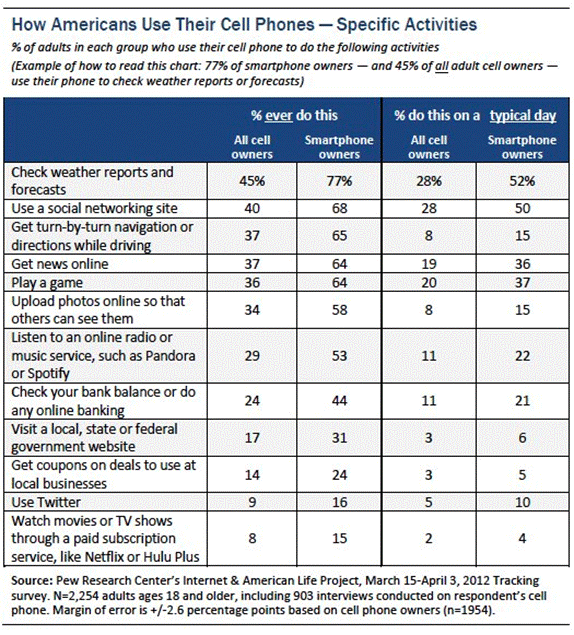In 40 years, the mobile phone transformed the world. What's next?
 40 years ago the world changed in a big, big way. On April
3, 1973 Motorola engineer Martin Cooper made the first cellular phone call
using the Motorola DynaTAC, a device nicknamed “The Brick” that’s to it’s
bulky, awkward and heavy brick-like design. With one call, Motorola changed
the future of the world.
40 years ago the world changed in a big, big way. On April
3, 1973 Motorola engineer Martin Cooper made the first cellular phone call
using the Motorola DynaTAC, a device nicknamed “The Brick” that’s to it’s
bulky, awkward and heavy brick-like design. With one call, Motorola changed
the future of the world.
40 years later, the mobile phone continues to change the live of every human on the planet that it reaches, bringing connectivity to areas of the world without traditional communications infrastructure. With over 7B subscriptions and 4B subscribers penetrating more than 87% of the global population, there are now over 10 countries, ranging from the United States to China to Nigeria with over 100M mobile phone subscribers. Cisco predicts that by the end of 2013, there will be more mobile devices on the Earth than people.
Initially, cell phones were created to enable mobile voice communications. But that changed rapidly when these devices became access points to the Internet, giving people access to the world from a device they could keep in their pocket. Mobile phones, while still used for phone calls are more and more often used for other activities including texting, taking and sharing photos and video, accessing social networks and mobile web, mobile shopping, game playing, video watching and more.

In 40 years, the mobile phone transformed the world. What’s next?
Growth of mobile web: As eluded to earlier, today’s mobile phones are no longer simply phones. They are access points to the Internet, and in turn, the world. Mobile Internet access predicted to overtake desktop access as soon as 2014.
Mobile Content: With smartphones turning phone owners into content creators and sharers, content consumption via mobile phones has moved from a trend into a daily behavior. It will be key for companies interested in creating successful mobile marketing programs to tap into this creation/sharing/consumption behavioral shift, moving past text based mobile communications.
Personalization and Customization: Data is the hottest trend of 2013 and mobile data is a big reason for this. Since mobile devices are extremely personal to their owner (60% would rather give up their wallet than their phones), today’s marketers are being forced to utilize data to create highly customized mobile programs to maintain and deepen their relationships with their customers.
Mobile commerce continues to fuel the retail marketing space, pushing retailers to design better mobile experiences on web, via apps or through text messaging, as well as educating staff on how to use mobile payment systems. And for good reason, Juniper Research predicts mobile commerce to exceed $12B in 2014.
While the debate continues on whether customers really want to move from credit cards to mobile wallet, everyone agrees that mobile payments will only increase in usage and could be responsible for 50% of all sales in as little as 5 years.
Location based services: There is no denying the benefits of location based marketing on both the user and the brand. Hoteliers are reporting that 60% of same day bookings are coming in from customers within a 3-mile radius of their hotel, with the bookings coming in via mobile phones. Brands such as Quiznos use location technologies with quick to expire coupons are finding higher redemption rates and sales.
2014 and beyond: Don’t expect to see major movement on the augmented reality and wearable/drivable tech front. While these tools and programs will continue to roll out, adoption and consumer acceptance has not yet been proven. There is still much discussion on the ability and access mobile technologies will provide consumers. Many look to the launch of Google Glass to determine adoption models for wearable tech.
40 years ago, with one simple phone call, Motorola set off a series of events that has changed consumer behavior, and the world forever. Happy birthday mobile phone! We can’t wait to see how you continue to grow!
James Citron is Co-Founder and CEO of Mogreet, the market leader in delivering SMS and MMS messaging, with a focus on high quality mobile video. Mr. Citron is widely regarded as one of the foremost experts on mobile marketing, MMS and mobile video. He is an active member of the Consumer Best Practices Committee, Mobile Video and Mobile Advertising Committees for the Mobile Marketing Association. Mr. Citron is a frequent speaker at leading business, marketing, and mobile industry conferences, a published author (Mobile Marketing for Dummies), and an educator that loves to share his perspectives on building companies, entrepreneurship and exploring how to create positive change through mobility and technology.
 Tony Greenberg
Tony Greenberg
 Ivan Nikkhoo, Managing Partner – Navigate Ventures
Ivan Nikkhoo, Managing Partner – Navigate Ventures Michael Sherman, Neil Elan and Karine Akopchikyan
Michael Sherman, Neil Elan and Karine Akopchikyan Alejandro Guerrero
Alejandro Guerrero Eric Eide, Alliance for SoCal Innovation
Eric Eide, Alliance for SoCal Innovation Kevin DeBre
Kevin DeBre Braven Greenelsh
Braven Greenelsh Rob Freelen, Los Angeles Market Manager, Silicon Valley Bank
Rob Freelen, Los Angeles Market Manager, Silicon Valley Bank Braven Greenelsh
Braven Greenelsh Kaäre Wagner, Silicon Valley Bank
Kaäre Wagner, Silicon Valley Bank Al Guerrero, Silicon Valley Bank
Al Guerrero, Silicon Valley Bank Rob Freelen, Los Angeles Market Manager, Silicon Valley Bank
Rob Freelen, Los Angeles Market Manager, Silicon Valley Bank Sid Mohasseb
Sid Mohasseb William Hsu
William Hsu Braven Greenelsh
Braven Greenelsh Dinesh Ravishanker
Dinesh Ravishanker Dina Lozosfky
Dina Lozosfky Melinda Moore
Melinda Moore Ivan Nikhoo
Ivan Nikhoo Jaspar Weir
Jaspar Weir Erik Caso
Erik Caso Tracy Olmstead Williams
Tracy Olmstead Williams Dave Berkus
Dave Berkus Bernard Luthi
Bernard Luthi Peter Cowen
Peter Cowen Nick Hedges
Nick Hedges Eric Larsen
Eric Larsen Michael Terpin
Michael Terpin Steve Reich
Steve Reich